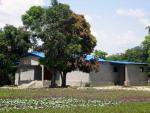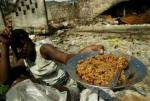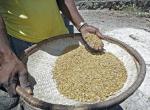Haiti Food Security Update (10/13/2008)
 Even before the hurricanes, Haiti was in emergency mode. The rising costs of food and fuel prompted riots and former members of the Haitian military had re-emerged in the north. According to Haitian Agriculture Minister Joanas Gue, the agricultural system has been destroyed. In many parts of the country, staple crops such as rice, corn, plantains, and yams were lost. The poorest farmers need assistance to purchase the seeds, tools, fertilizers and agricultural inputs that will ensure the success of the next harvest. Until then, food security is tenuous.
Even before the hurricanes, Haiti was in emergency mode. The rising costs of food and fuel prompted riots and former members of the Haitian military had re-emerged in the north. According to Haitian Agriculture Minister Joanas Gue, the agricultural system has been destroyed. In many parts of the country, staple crops such as rice, corn, plantains, and yams were lost. The poorest farmers need assistance to purchase the seeds, tools, fertilizers and agricultural inputs that will ensure the success of the next harvest. Until then, food security is tenuous.







